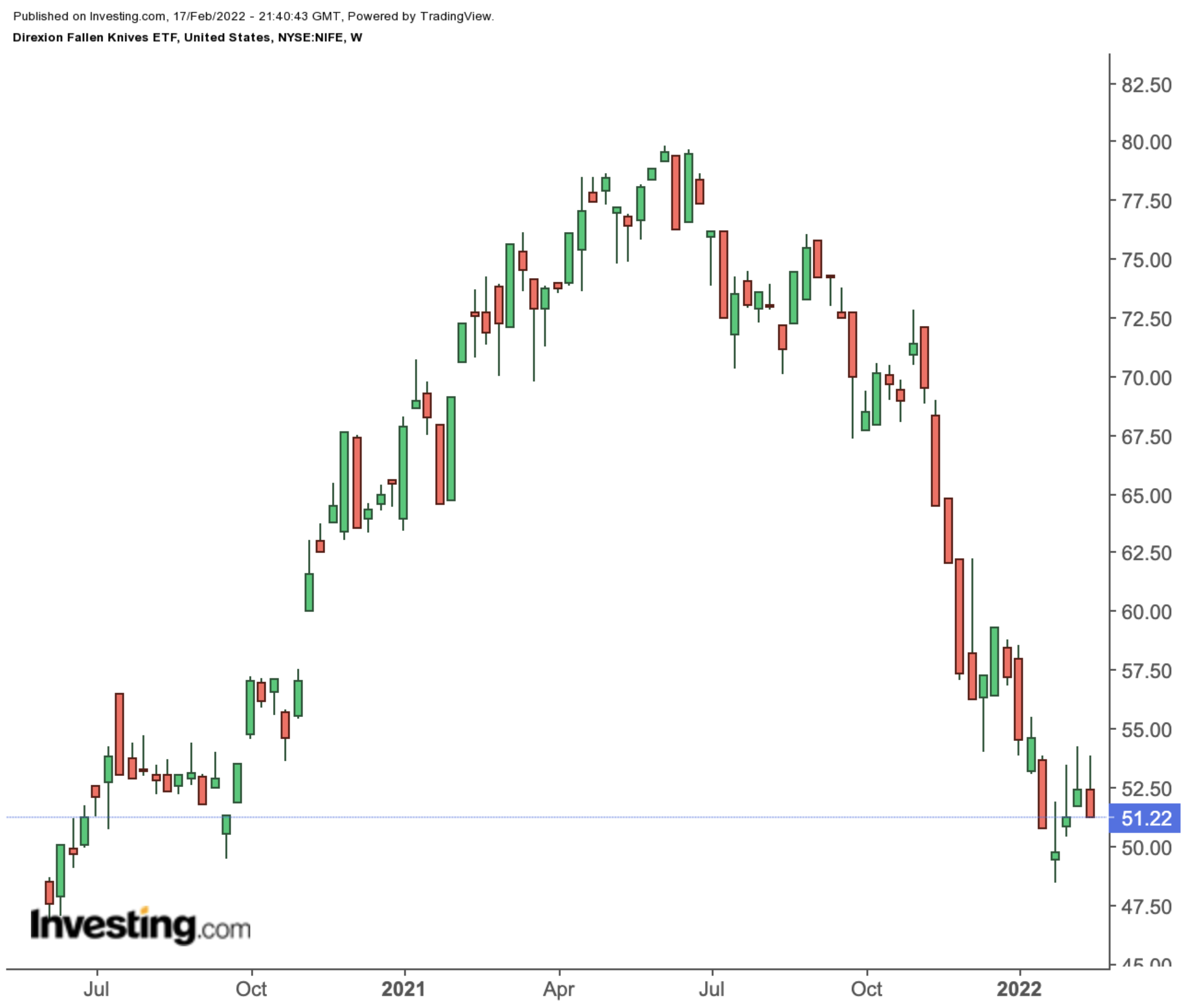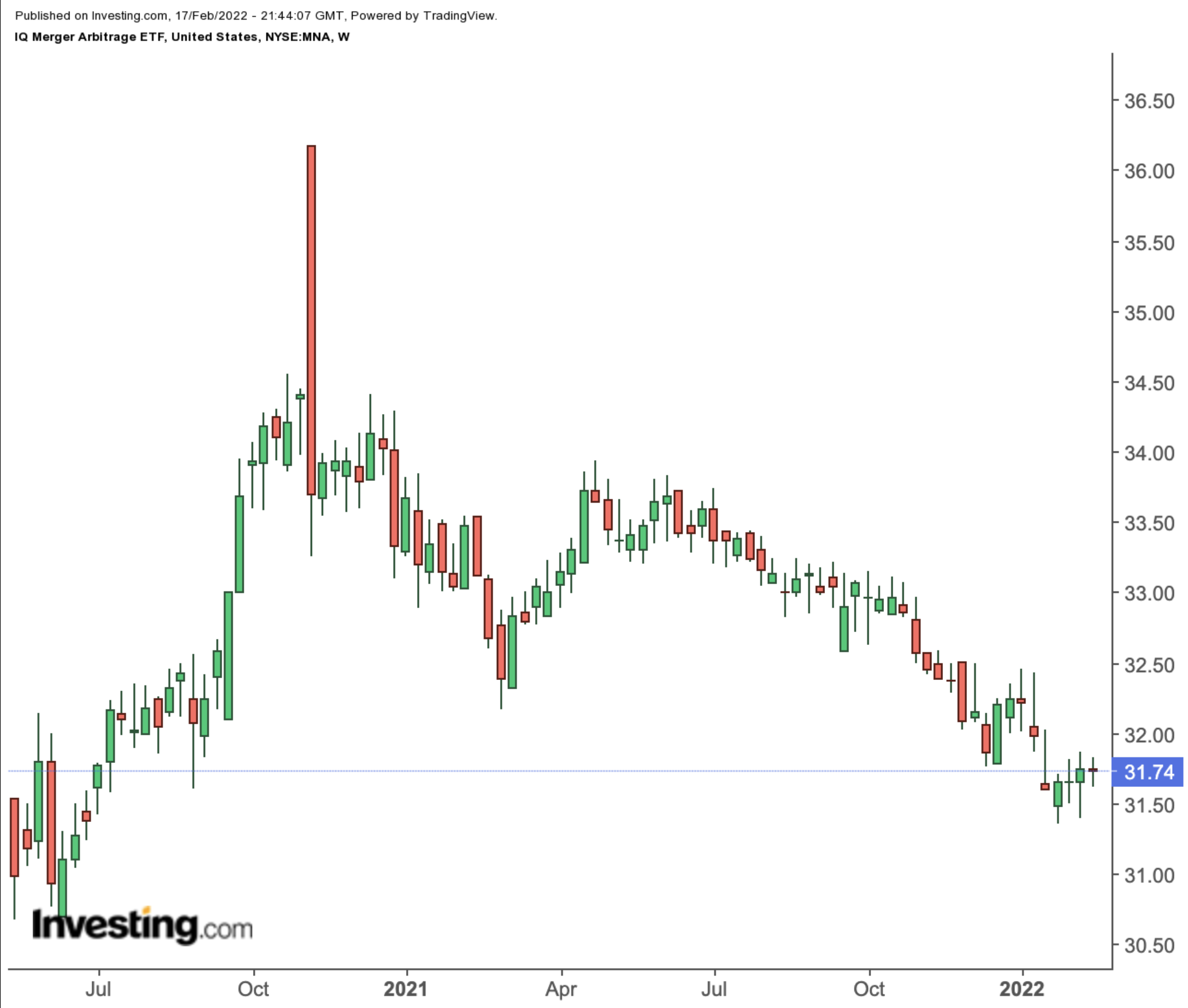Thematic exchange-traded funds (ETFs) aim to provide exposure to some of the hottest trends and industries in the stock market. Rather than looking for a winning stock, these thematic funds offer investors a convenient way to play a particular theme. In other words, they could ride the wave, lifting an entire industry or sub-sector.
However, these ETFs do not typically provide adequate portfolio diversification. As the fortunes of stocks in those funds are often tied to the same underlying theme, their narrow exposure might mean a higher risk profile.
Thus, these funds function better when complementing a portfolio rather than replacing existing core holdings. Ideally, they can be single-stock substitutes for those looking to play a theme without conducting due diligence on individual stocks.
On a final note, many thematic funds have high annual expense ratios.
With that said, here are two thematic ETFs that deserve further attention.
1. Direxion Fallen Knives ETF
- Current Price: $51.22
- 52-Week Range: $48.38 - $79.83
- Dividend Yield: 6.07%
- Expense Ratio: 0.50% per year
Our first fund, the Direxion Fallen Knives ETF (NYSE:NIFE), provides exposure to shares that have lost significant value in the past year. Yet, fund managers believe these names are financially healthy and could rebound before too long. The fund started trading in June 2020.

NIFE, which has 49 holdings, tracks the US Fallen Knives Index. The top 10 names account for almost half of net assets of $4 million. So, it is still a small ETF that is also top-heavy.
In terms of sectors, we see healthcare with 46.68%, followed by information technology, IT (28.53%), consumer staples (8.60%), and consumer discretionary (7.49%).
The top holdings in the fund include food products manufacturer McCormick (NYSE:MKC); biopharma name Sarepta Therapeutics (NASDAQ:SRPT); software-as-a-service (SaaS) group Citrix Systems (NASDAQ:CTXS); resort and casino operator Las Vegas Sands (NYSE:LVS); and data analytics platform Splunk (NASDAQ:SPLK).
NIFE hit a 52-week low in late January. The fund is down 28.2% over the past year and 10.4% year-to-date. Put another way, so far in 2022, it has not been possible to catch the falling knife.
Yet readers looking for stocks currently out-of-favor, that may recover over the rest of the year, could consider investing around these levels.
2. IQ Merger Arbitrage ETF
- Current Price: $31.74
- 52-Week Range: $31.35 - $33.93
- Expense Ratio: 0.76% per year
The IQ Merger Arbitrage ETF (NYSE:MNA) invests in global stocks for which there has been a recent public acquisition announcement. The ETF also provides short exposure to global shares as a partial market hedge. The fund tracks the IQ ARB Global Merger Arbitrage Index.

MNA, which was first listed in November 2009, currently has 66 holdings. The leading 10 names comprise roughly 45% of net assets of $634.5 million. IT shares have the highest slice with 21.4%. Next come financials (13%), real estate (8.6%), and consumer discretionary (7.3%).
Over half the companies are based in the US. Then, we see stocks from the UK, Australia, Canada, Germany, and Italy, among others.
Here are several of the companies in the fund and their acquirers:
- Conversational artificial intelligence provider Nuance Communications (NASDAQ:NUAN)—acquired by Microsoft (NASDAQ:MSFT)
- Biopharma group Arena Pharmaceuticals (NASDAQ:ARNA)—acquired by Pfizer (NYSE:PFE)
- Healthcare information technology provider Cerner (NASDAQ:CERN)—acquired by Oracle (NYSE:ORCL)
- Cloud security specialist Mimecast (NASDAQ:MIME)—taken private by private equity group Permira
- Data center real estate investment trust REIT CyrusOne (NASDAQ:CONE)—taken private by KKR (NYSE:KKR) and Global Infrastructure Partners
MNA recently hit a 52-week low in January. The fund is down more than 4.6% over the past year and 1.5% since the start of 2022.
A merger arbitrage fund like the MNA ETF could be an alternative diversification tool for some portfolios. Readers might be interested in researching two other similar funds, namely the Merger Fund and the The Arbitrage Fund Class R.
